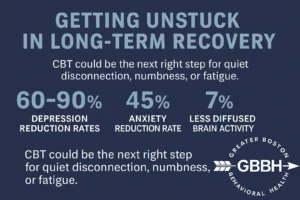You got through the hardest part. You stayed clean. You did the work.
Now you’re a year—or maybe five—into recovery, and from the outside, it looks like life is good.
But on the inside?
You’re not spiraling. You’re not relapsing. You’re just… stuck.
That inner voice that once burned bright with hope has gone quiet.
You wake up and think, Is this really all there is?
If any of this rings true, Cognitive Behavioral Therapy (CBT) might be exactly where you need to go next. Not because you’re broken. Not because you’re failing. But because something inside you is asking to be seen—and CBT offers a safe, nonjudgmental place to begin that conversation. Explore CBT at our Boston facility.
Long-Term Recovery Isn’t Supposed to Feel This Flat—But It Often Does
Many alumni reach out to us months or years after completing a program, quietly wondering if something is wrong. They’re not using. They’re not in crisis. But they feel disconnected, hollow, or emotionally numb.
This isn’t uncommon.
It’s what happens when the initial momentum of recovery wears off and the “maintenance phase” of life takes over.
You show up. You stay steady. But you don’t feel fully alive.
And that’s not something to ignore.
CBT Meets You in the Now
Unlike some forms of therapy that focus heavily on childhood or past trauma, CBT is rooted in the present moment. It asks simple but powerful questions:
- What thoughts are shaping how you feel right now?
- What patterns keep looping?
- What stories are you telling yourself—and are they still true?
If you’ve ever caught yourself thinking, “I should feel better by now,” or “Something’s missing, but I don’t know what,” CBT gives you a structured, supportive space to untangle those thoughts without judgment.
It’s Not About Starting Over. It’s About Realigning.
Think of CBT like a chiropractor for your thoughts. You don’t need a major injury to benefit. You just need to notice when something’s out of alignment.
Maybe you’ve internalized pressure to “stay grateful” or “focus on the positives.”
But part of recovery is being honest—even when that honesty feels inconvenient.
CBT invites you to stop pushing down what’s real, and start exploring what might want to change.
You don’t have to flip your life upside down. You just have to get curious about the quiet parts.
“Coming back to therapy after years in recovery felt strange at first. But once I started CBT, it felt less like ‘going back’ and more like finally checking in with myself again.”
– Alumni, 2022
Structured, But Never Forceful
One reason CBT is a great fit for long-term alumni is its balance: it offers structure without intensity.
You won’t be asked to perform or over-explain. CBT isn’t about diving deep into everything all at once. It’s about noticing how your thoughts affect your mood, your relationships, and your energy—and then slowly adjusting the habits that no longer serve you.
If your early recovery was full of urgent work and emotional sprints, CBT will feel like a calmer, steadier walk.
Reconnecting to What Still Matters
At Greater Boston Behavioral Health, our CBT therapists help clients reconnect—not just with their thoughts, but with their values. That spark you felt in early recovery? It might feel dim now, but it’s not gone. It just needs fuel.
CBT can help you:
- Rebuild emotional momentum without pressure
- Identify and challenge quiet patterns of self-judgment or resignation
- Reconnect with purpose and long-term goals
- Find energy again in the small, overlooked parts of life
This is not a reset. It’s a re-engagement. It’s a way back into your life—not a detour from it.
Boston-Based Support That Honors Your Recovery
We know the Boston recovery community is strong—and we also know that not everyone in long-term recovery wants to be in group settings or 12-step rooms forever. Some need private, focused, one-on-one support. Others want tools, not just validation.
That’s where CBT comes in.
We offer CBT both as a standalone service and as part of ongoing mental health support. Our therapists understand what long-term alumni face. They know how to hold space for growth, fatigue, and uncertainty—without framing it as failure. If you’re near Boston, Dedham, Waltham, Needham, or West Roxbury, Massachusetts, GBBH offers programs with that same approach.
Learn more about our CBT program here.
CBT for Long-Term Recovery: FAQs
Is CBT only for people in crisis?
Not at all. CBT is one of the most versatile and widely used therapy models because it’s effective across many stages of mental health and recovery. Many people use CBT when they feel “off” but can’t pinpoint why.
What if I’ve already done therapy?
That’s common. CBT might feel different than past experiences because it’s so focused on the present. Even if you’ve done therapy before, CBT offers new tools and perspectives that can complement the work you’ve already done.
Will CBT feel like going back to early recovery?
No. We’re not here to take you backward. CBT meets you exactly where you are today. It’s not about rehashing the past—it’s about working with what’s happening now.
How long do I need to be in CBT?
There’s no set timeline. Some people benefit from short-term CBT (around 6–12 sessions), while others use it as an ongoing form of maintenance. You and your therapist will decide what pace works best.
Can CBT help with depression or burnout in recovery?
Absolutely. Many long-term alumni experience periods of burnout, low mood, or emotional disconnection. CBT is especially effective for these symptoms because it helps break down the thought patterns that fuel them.
Ready to Reconnect?
If the spark feels dim—or if you’re simply curious about what’s next—CBT could be your next step. No crisis required. No performance needed. Just a safe space to check in, slow down, and realign.
Call (888) 450-3097 or visit to learn more about our CBT services in Boston, Massachusetts.


